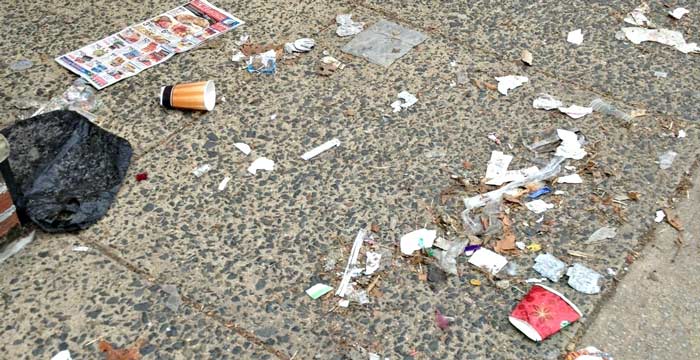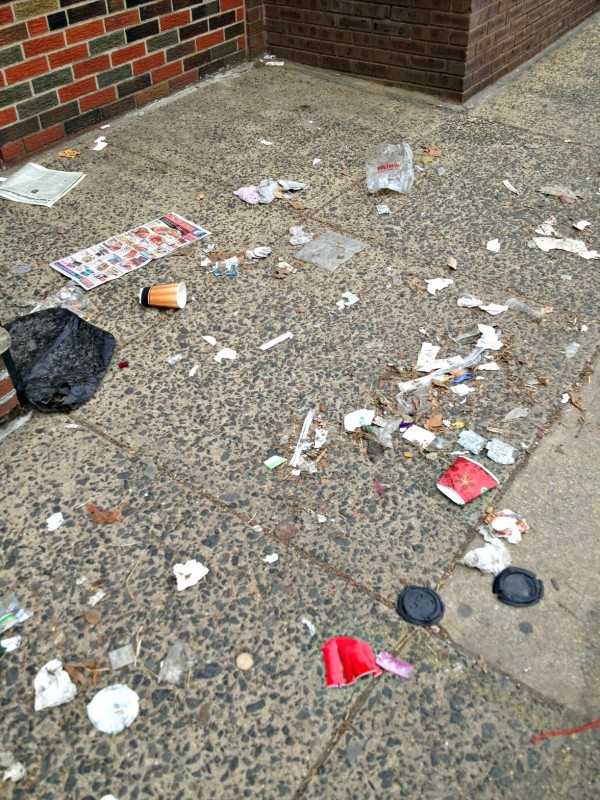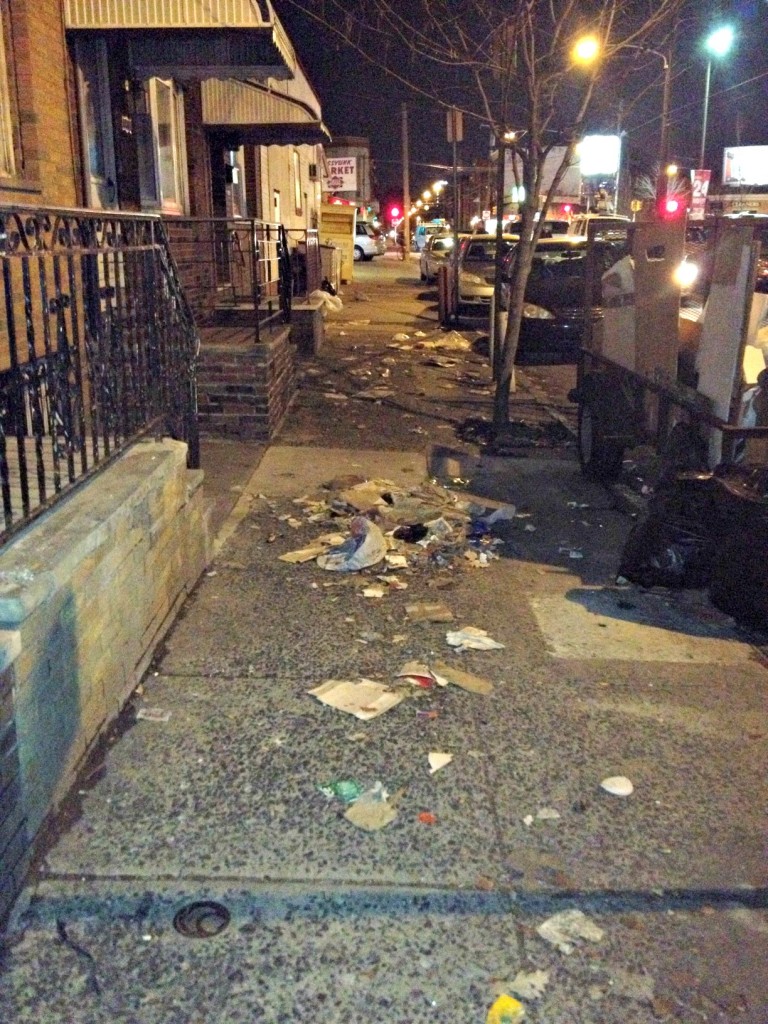
Why is Philly So Dirty? The Litter Epidemic
In honor of Earth Day, I wanted to dig deeper on one of Philadelphia’s larger sustainability problems: litter. Why is there so much of it? What do residents (and the city) think? Enjoy, and Happy Earth Day!

Let’s face it: our city has a notorious reputation for being dirty.
Don’t believe me? Walk the streets of London for a few hours or ride the metro in DC. Return to Philly and compare. But when people talk about Philly being dirty, they’re often referring to our litter problem.
Yet litter is such a large, debated topic. How do we combat litter? Do we concentrate efforts on educating people or cleanup efforts after the fact?
Neighborhoods with litter tend to have higher crime rates, lower property values and less pride in the neighborhood. In order to get a more insight on Philly’s litter, I asked the City of Philadelphia, a few friends and associates about their experiences with trash in the city.
Why is Philadelphia so dirty?
We can blame litter on a variety of sources. Here’s a few reasons why litter accumulates:
- The Litterer. I recall walking down South Street and seeing a man with a toddler walking by his side. He simply dropped his soda container onto the sidewalk like it was nothing. There’s instances of this happening across the city, from total apathy to cigarette smokers with butts. As Hawthorne resident Lauren Long commented, “South Street is filthy, because people who don’t live in the area come in on the weekends and throw trash on the ground. I’ve seen people drop full drinks, chicken wings, half of sandwiches. It’s honestly one of the most disgusting thing I’ve ever seen, and I can’t even comprehend throwing something on the ground.”
- Accidental litterer. We can all be guilty of this: an occasional receipt floating out of your pocket or dropping a lip gloss tube when trying to get your keys out. Usually the accidental litterer doesn’t notice the mishap and carries on business as usual.
- Trash day carnage. Trash day tends to have much litter floating around as either trash falls manually from the sanitation department workers. This past week I noticed several beer cans, a plastic bag and a few boxes leftover from what the garbage collection did NOT pick up. Sometimes the sanitation workers do have someone who picks up the flyaways, but not every time.
- Insufficient trash receptacles. Not only does trash accumulate from sanitation workers, but residents not using sufficient trash bins and lids. As Philly renter Stephanie Johnson summed up, “I am sick of people putting out paper Trader Joe’s bags that are over loaded with garbage on windy, rainy, or snowy days and within minutes the bags have turned over or disintegrated and their garbage is all over the sidewalk. Those bags are not stable and not designed to withstand the elements.”
- Skipped or late days. Many people complained this past winter when the Streets Department didn’t pick up trash, skipping a few neighborhoods for weeks due to snow removal. Some residents either didn’t hear the broadcasts or ignored it, as they left out their trash for a week instead of taking it back inside. Trash and recycling accumulates more when there’s a late pickup, as there’s more chance for wind, cars to carry the litter.
- Plastic Bags. So lightweight, plastic bags become litter easily, ending up in streets, trees and under cars.
- Disposables. Since there are no incentives to return or recycle disposable items (i.e. bottling fees), people have a mentality that these items are worthless. They don’t care what happens to the soda bottle once they drop it in a trashcan, recycle bin or ground.
- Street Trash Cans & Big Bellies. Several neighborhoods actually have removed trashcans from their streets because residents will pile bags next to trashcans instead of waiting for their trash cans. Also, lack of trashcans throughout the city tempt people to throw their trash wherever – in a bush, etc.
- Dog poop. Literally, people have placed plastic bags with dog poop on the street, which do not get picked up. (Dog owners, please throw it in a trashcan.)
Between all of these different sources, litter is inevitable. But who is responsible for the cleanup? Does the city’s perspective align with our residents?
Litter in Philadelphia: The city’s perspective
We asked the City of Philadelphia’s Deputy Commissioner Donald Carlton a few questions from the city’s perspective.
Green Philly Blog: Is litter the city’s responsibility, citizens or neighborhood committees?
Donald Carlton: It is a shared responsibility between all parties. The City does what it can to clean and educate, but it is ultimately the responsibility of the citizens to live responsibility in their neighborhoods and maintain their neighborhoods on a daily basis to be litter free.
GPB: What does the city do for litter prevention/cleanup?
Donald Carlton: “Attacking litter has to be a well rounded effort. We address litter from 3 angles, enforcement (SWEEP), cleaning efforts (PMBC), and programs to inspire and promote good behavior (UnLitter Us). We mechanically clean approximately 50,000 miles of city streets annually and remove approximately 15,000 tons of illegally dumped debris.
We write over 140,000 citations for numerous quality of life issues, including litter. However, to be successful we cannot rely only on cleaning up behind visitors and citing residents. We strive to inspire Philadelphians to take responsibility for their actions and ownership of their block, specifically through the UnLitter Us program. UnLitter Us allows us to network with our residents and community based groups while promoting positive behavior. We hope to promote sustainability through positive interaction.”
GPB: There are signs about streets sweepings weekly. Do any actually get swept? (Which ones?)
Donald Carlton: Yes, the Streets Department provides mechanical cleaning along commercial corridors.
Note: We have not received any further insight on how often or where the street sweeping occur, including any routes that are regularly swept.
GPB: Can citizens call/tweet/etc if there’s litter on their street? What’s the extent that they can get help?
Donald Carlton: The most appropriate action residents to do when they see litter is to pick it up themselves. If the items are large/bulk, residents can call 311 or Streets Dept. Customer Affairs Unit at 215-686-5560, or enter request at potholes.phila.gov. Once a report is made, a supervisor is sent to the location to investigate. Appropriate action is taken on whether to collect the items as illegal dumping, send an Enforcement Officer to cite and educate if possible, or both.
Litter in Philadelphia: Resident’s perspective
How does the average city resident compare to the city’s litter perceptions? Do they take as much ownership as the city would like them to?
It’s a constant battle for many homeowners and renters alike.
As South Philly homeowner and Be Well Philly Editor, Emily Leamen expressed, she’s frustrated with the constant trash swirling in front of her house:
“I’d be happy to do my part — i.e. spot sweeping between formal street cleanings — but we don’t get any support from the neighborhood or city so it pretty much entirely falls on us, which is feels very defeating. Imagine coming home from work every single day and having to walk through a pile of trash just to get up your steps.”

Roxborough homeowner Natalie Ezdon echoes Leaman’s sentiment: she does her part, but can’t tackle it all and is discouraged at times. “I usually pick up other people’s trash, but sometimes I’m too angry and I just leave it on the ground. If no one else wants to pick it up, why should I bother…”
From my informal research, it appeared that renters feel an equal obligation to their neighborhoods, as well as the frustrations.
West Philly renter Beth Cain is an active participant in cleanup efforts. “Living in Cedar Park I feel very fortunate, since I don’t encounter the South/North Philly levels (of trash) daily. I still feel obligated to pick up trash in front of my house, keep my sidewalk clean, encourage neighbors, etc. I’ve always been a trash picker upper, but there are neighborhoods that that just too heavily covered for a person to pitch in while walking.”
Bella Visa resident Angela Stockler echoes Ezdon’s apathy. Philly’s evolving up-and-coming neighborhoods blur sectional boundaries, contributing to where the litter is concentrated. “Many of the problems stem from the fact that nice areas and not-so-nice areas are all right on top of each other. Those who choose to be disrespectful to the planet discard their trash into the streets and that eventually makes it to the neighborhoods where people do care. It is just too much to keep up with.”
Overall, renters and owners both take ownership by picking up around them, but want more help from the city. Whether there’s too much litter, it’s dangerous/unsanitary to pick up or falls outside their realm of responsibilities, Philly residents are frustrated by the massive amounts of litter in the neighborhoods.
Litter in Philly: Neighborhood Perspectives
I recently attended a Bella Vista Beautification committee. They discussed different ways to tackle litter: getting business participation, hiring workers to sweep the streets, and others. However, neighborhoods often have fund their efforts by involving businesses, fundraisers or other means.
Northern Liberties has an active community, from an online message board about neighborhood events to regular park cleanups and gatherings. Recently, Northern Liberties created Project Clean Streets, hiring “a small crew to sweep designated streets and problem areas once a week.”
SOSNA (South of South Neighborhood Association) has also taken initiatives to improve their streets. In recent years, they purchased Big Belly Trash Compactors for the neighborhood with help of donations.
Litter in Philly Versus Other Cities
So how does Philly compare with litter to other cities?
A recurring theme in the discussions about litter is that Philly is dirtier than other cities. As Cain, who grew up around Cleveland Ohio, said, “I had friend visiting a few months ago, making sure they saw the best of the best. When we got to the Italian Market, I was actually embarrassed by the trash stuffing the gutters.”
Philly resident Natalie Ezdon is finishing her Masters at NYU on Saturdays. Her experience, “NYC seems pretty clean to me. Every Saturday morning I see NYC workers cleaning up trash along W. 3rd Street in the Village. By the time I walk along the same street in the afternoon, the streets are pristine.”
Beyond the US, Japan is notorious for its clean reputation. As Kelsey Gibbons said, “A colleague mentioned a recent trip to Japan, where he had found that the trains ran exactly on time, the streets were spotless, and everyone recycled with proper segregation. He attributed both things to cultural differences, the first being an impeccable sense of politeness, and the second being a large sense of pride in their community… There are very few public trash or recycling bins, as a sense of personal responsibility is emphasized, along with a “pack in, pack out” mentality. Their scarcity of land makes them incredibly conscious about generating waste.”
Litter: Solutions?
Philadelphia’s efforts for education, Philadelphia More Beautiful Committee with block captains, and events like the Philly Spring Cleanup Day all contribute to public awareness of litter.
How can we bring more awareness to personal obligations?
One of my favorite anti-litter tactics came from Graduate Hospital resident Gibbons. “When I was at Drexel, I used to notice a lot of kids littering on campus, and I came up with a pretty effective shaming strategy. It usually happened on campus when there were groups of people around, and I would pick up whatever they had thrown on the ground, rush up to them and say very kindly “Oh my goodness, I’m so sorry, you just dropped this,” as if their littering was some grand mistake. And usually they were so embarrassed that they took it back, thanked me and hurried away.”
Yet regardless of how many public awareness campaigns, bus slogans and personal shaming we do, Philadelphia does have bigger fish to fry before ‘conquering’ litter. Can we fund private teams to pickup litter city-wide if we can’t fund our schools? Can we get everyone involved?
As Gibbons sums up, “If someone doesn’t feel empowered to overcome their own life circumstances, they certainly won’t feel empowered enough to clean up their neighborhood. If you don’t feel a lot of pride in your surroundings, I imagine it would be very hard to find the motivation. And what is the greatest cure for poverty? Ah, yes…. education. It always seems like removing litter is such a simple thing, but it’s much more indicative of some deeper societal ills.”
Readers, what do you think Philadelphia can do to help attack litter and improve our city’s reputation? Let us know in the comments.









